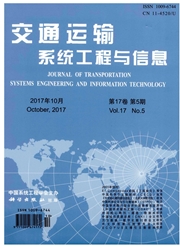

 中文摘要:
中文摘要:
综合评述了活动一出行行为研究方法和存在的问题,引入贝叶斯结构学习和参数估计方法,辅以基于活动的出行行为分析理论、非集计建模方法和SP/RP数据融合方法,提出了基于贝叶斯结构学习和参数估计方法的出行行为与TDM策略互动关系分析方法的框架,探索了改进已有研究方法的途径.研究表明,贝叶斯理论可以将居民的个人属性及隐性非样本信息在出行行为预测中充分表达,并解决MNP等复杂非集计模型的参数标定问题.将贝叶斯理论与已有的出行行为分析方法相结合,可以使出行行为预测更为精确、全面和灵活,从而更加准确地描述活动一出行决策行为与TDM策略的互动响应关系,为制定有效的TDM策略,缓解城市交通供需矛盾提供理论依据.
 英文摘要:
英文摘要:
This paper reviews the research methods of activity-travel behavior and the existing problems. By introducing Bayesian structuralized learning and parameter estimation methods, assisted by activity-based travel behavior theory, disaggregate modeling, and SP/RP data investigation method, this paper establishes an analysis framework of the interactions between travel behavior and TDM strategy, and discusses the way to improve the existing methods. It indicates that Bayesian method can fully express individual attributes and recessive non-sample information in travel behavior forecasting, and estimate some complex disaggregate models, such as MNP (muti-nomial probit). Combined with existing travel behavior analysis methods, Bayesian method makes travel behavior forecasting more accurate, comprehensive, and flexible. It can also describe interactions between activity-travel decision behavior and TDM strategy more exactly, provide theoretical basis for establishing effective TDM strategy, and alleviate contradiction of urban traffic supply and demand.
 同期刊论文项目
同期刊论文项目
 同项目期刊论文
同项目期刊论文
 期刊信息
期刊信息
